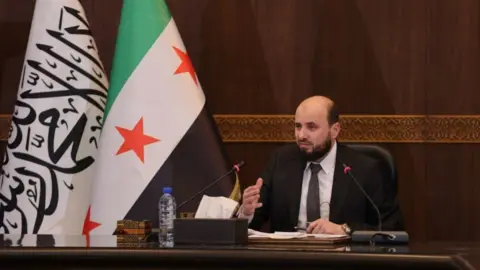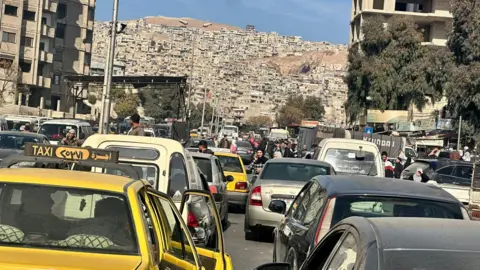Syria’s new transitional Prime Minister wants stability and calm

 Telegram
TelegramThe prime minister of Syria’s new transitional government said it was time for people to “enjoy stability and calm” after the overthrow of President Bashar al-Assad.
Mohammed al-Bashir, the former head of the rebel administration in the northwest, was speaking to Al Jazeera after being given the task of ruling until March 2025 by the Islamic terrorist group Hayat Tahir al-Sham (HTS) and its allies.
Bashir chaired a meeting in Damascus on Tuesday attended by members of his new government and those of Assad’s former cabinet to discuss the transfer of positions and institutions.
This came as the UN envoy to Syria said the rebels must turn their “good messages” into action on the ground.
Meanwhile, the US secretary of state said Washington will recognize and fully support the future Syrian government as long as it emerges from an honest, inclusive process that respects minorities.
In 2011, Assad brutally crushed a peaceful democratic uprising, sparking a devastating civil war in which more than half a million people were killed and another 12 million forced to flee their homes.
Before this week, Mohammed al-Bashir was little known outside of HTS-held areas in the northwestern provinces of Idlib and Aleppo.
According to his CV, he trained as an electrical engineer and worked in the gas industry before the start of the civil war in 2011.
In January, Bashir was appointed prime minister of the Salvation Government (SG), which was established by HTS to govern its territory.
The SG operated as a state, with ministries, local departments, law enforcement and security authorities, while maintaining a religious council guided by Islamic law.
About four million people, many of whom were displaced from other parts of the country, lived under its rule.
When facilities stopped working in Aleppo after HTS and its allies captured the city earlier this month in the first of their lightning strikes, the SG stepped in to restore public services.
It is reported that experts helped repair local electricity and communications, security forces patrolled the streets, doctors volunteered at hospitals, and charities distributed bread.
“It is true that Idlib is a small region that lacks resources, but they [SG officials] they have the upper hand after starting nothing,” HTS leader Abu Mohammed al-Jolani was heard telling Assad’s former prime minister, Mohammed al-Jalali, in a video of a meeting in Damascus on Monday.
“We will benefit from your experience. We will certainly not ignore it,” he added.
On Tuesday, Bashir was pictured presiding over a meeting of former SG ministers and ministers who served under Jalali. He was seated in front of the Syrian opposition and HTS flags.
“[We] we have invited members of the old government and some administrative directors in and around Idlib to make it easier to do all the necessary work in the next two months until we have a constitutional system that will be able to serve the people of Syria,” Bashir told Al. Jazeera after that.
“We had other meetings to restart the institutions so that we can serve our people in Syria,” he added.
Meanwhile, life seemed to be slowly returning to normal in the capital Damascus after two days of lockdown.
There were many pedestrians and cars on the streets, and some shops and restaurants were open.
People also swept up ammunition strewn on the ground in central Umayyad Square, where dozens of rebels fired into the air as crowds celebrated the end of Assad’s 24-year rule.
A Muslim cleric there told the BBC that the people of Syria are looking to the future and want a peaceful and united country.
“We want to establish a nation built on the principles of citizenship, justice, and the rule of law, a technological nation where institutions are respected, and equal opportunities are guaranteed to all,” said Sheikh Abdul Rahman al-Kouky.

UN special envoy Geir Pedersen told reporters in Geneva about the change needed to ensure “representation of the Syrian community and Syrian parties”.
“If this does not happen, we risk new conflicts,” he warned.
Pedersen said the designation of HTS as a terrorist organization by the UN, US, UK and other countries will be a “disturbance” in efforts to find a way forward.
HTS’ predecessor, al-Nusra Front, pledged allegiance to al-Qaeda in 2013. But three years later, it officially cut ties with the jihadist group.
“The reality is now that HTS and other armed groups have been sending positive messages to the Syrian people… of unity, of inclusiveness,” Pedersen noted.
“They also gave us sightings… of convincing things on the ground” in Aleppo and Hama, another major city captured last week, he added.
He said the most important test will be how the reform programs in Damascus are planned and implemented.
“If they really unite all the different groups and all the communities in Syria… then there is a chance for a new beginning.”
“And I believe that the international community will look [terrorist] HTS listing as well,” he added.
Later, US Secretary of State Antony Blinken actually laid out a series of conditions that, if fulfilled, would see Syria enjoy full recognition by Washington.
“It is important that all actors involved protect civilians; respect human rights, especially vulnerable minorities; preserve government institutions, their services to help meet the needs of Syrians; and build towards inclusive governance,” he said.
“The statements of the rebel leaders about these objectives are very welcome, however, the true measure of their commitment is not just what they say but what they do.”
Source link




